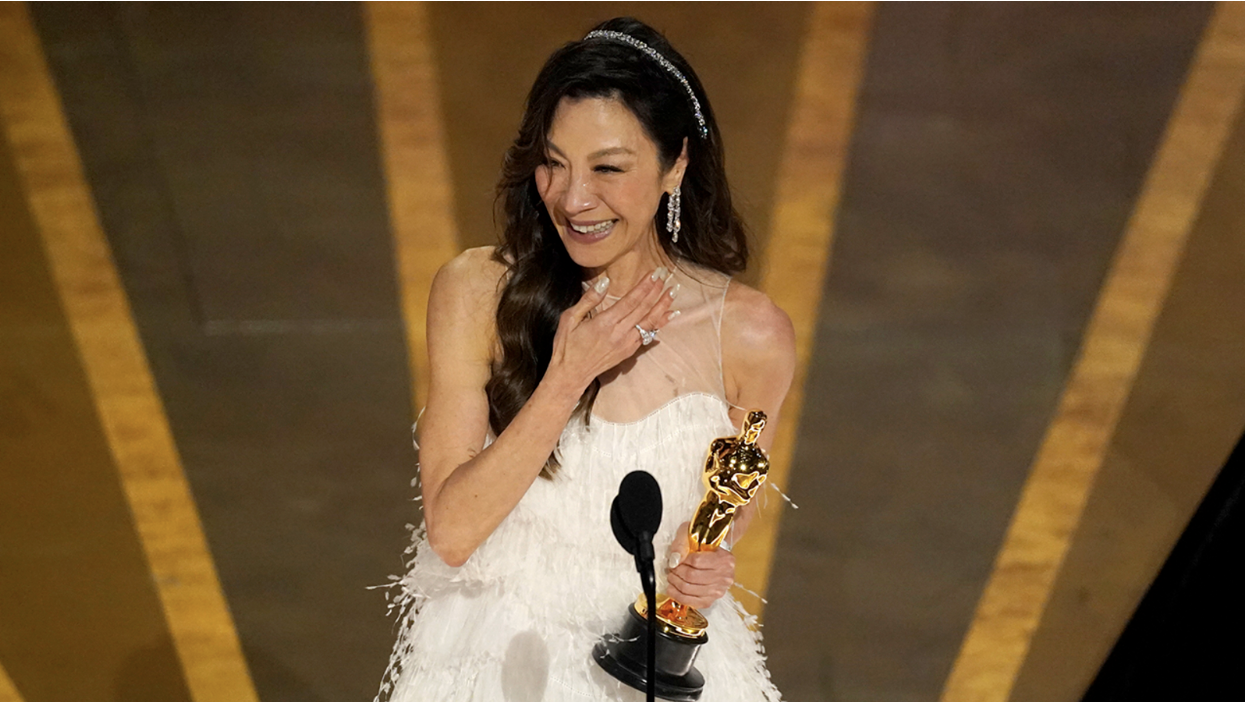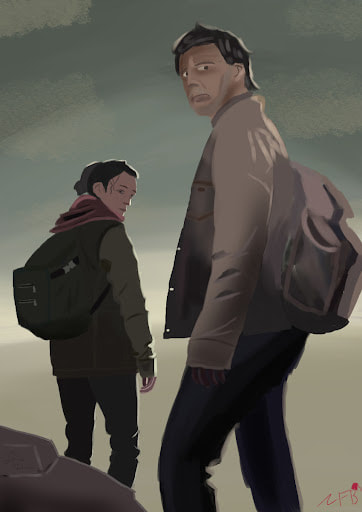|
By Julian Villegas
Culture Columnist On January 24, 2023, the Oscar nominations were announced and it was once again that point in the year where it became a talking point. Whether it be people talking about what should or shouldn’t have been nominated, what should or shouldn’t win, or whether or not people still care about the Oscars, a lot of people talk about this award show. Many well acclaimed movies were nominated for a plethora of categories and one of the movies that reached both critical and commercial acclaim this past year was Everything, Everywhere, All at Once directed by Daniel Kwan and Daniel Scheinert. And unsurprisingly to many, when the Oscars finally rolled around on March 12, this film managed to take home a total of seven awards. One moment in particular that was a highlight of the night was when lead actress of Everything, Everywhere, All at Once, Michelle Yeoh, won the Best Actress award. This was not just a notable moment of the night, but a historical one as Yeoh is the first ever Asian-American actress to win this award. Many fans were expressing their joy of Yeoh’s success from all her hard work throughout her career as well as what this means for Asian representation in Hollywood and the film industry. Despite being the first ever Asian-American to win Best Actress, she was not the first to be nominated for this award. Back in 1935, Merle Oberon, who is of South Asian descent, was nominated for this exact award thus making her the first Asian-American to be nominated. However, due to that time period, Oberon hid her South Asian ancestry out of fear of losing her career. So to see Michelle Yeoh, not only be nominated in this award but to also win it was a special moment to see. On top of Michelle Yeoh’s win, this year’s Oscars became a big year for Asian representation in film, as we also saw several other awards given out towards Asian and Asian-American films. Other awards that Everything, Everywhere, All at Once received includes Ke Huay Quan who, after quitting acting for over 20 years due to lack of roles he was able to get, won the award for Best Supporting Actor. We also saw some South Asian success with “Naatu Naatu” from the movie RRR winning best original song, this being the first time ever an Indian movie has been awarded with an Oscar. Representation is important, and while not perfect in the slightest, the film industry is making steps to showcase and award representation for minority groups. Times have changed since the 1930s, actors no longer have to hide their own heritage to save their career. Now we can see those same people who got rejection after rejection throughout their life finally be able to find some success. Kids can grow up and see people who look like them succeed in life. And as Michelle Yeoh stated in her acceptance speech at the Oscars: “To all the little boys and girls who look like me watching tonight, this is a beacon of hope and possibilities. This is proof, dream big, dreams do come true. And ladies, don’t let anybody ever tell you that you are past your prime. Never give up!”
0 Comments
Does HBO’s new hit series live up to the original? Image C/O @fez_bot06 By Andrew Martinez Cabrera Culture Columnist *Spoilers Ahead*
For years, video game adaptations garnered the same fate as a thespian muttering “Macbeth” during a theatre production. The issue with adapting games to a new format is that a video game’s appeal relies on the medium’s most notable characteristic: gameplay. Restricting the viewer to a bystander position when they are used to controlling the character’s actions results in a feeling similar to watching your older sibling play on the Xbox while you impatiently wait for your turn. Possibly the greatest reason for the success of HBO’s “The Last of Us” is that the original 2013 game, developed by Naughty Dog, already possessed a cinematic approach to its narrative. Brought to the small screen by Neil Druckmann, the original writer and creative director, and his new collaborating partner Craig Mazin, the adaptation of “The Last of Us” strives to deliver the same story for audiences new and old, naturally with deviations that are usually credited under Mazin. Both versions of “The Last of Us” follow Joel, a hardened smuggler tasked with escorting a 14-year-old girl named Ellie across a post-apocalyptic America, swarmed by ‘infected’ fungal people and dangerous raiders. Although sounding cliche, what separates “The Last of Us” from the rest of those similarly spun apocalyptic tales is that the setting and situation are secondary. The true purpose of the game resides within the characters. For the original game, Druckmann constructs the story through the philosophy of “simple story, complex characters.” For the video game, it is the emotional resonance, the interactive agency when controlling Joel, and the blossoming connection that Joel and Ellie share which makes “The Last of Us” such a unique artistic experience. This is especially true when players get to spend time with the duo for 15 hours. The HBO series is granted a similar luxury of nine hours of watch time. However, Mazin decides that those nine hours would be utilized elsewhere, giving more screen time to secondary characters from the original game rather than fleshing out Joel and Ellie's characters to new audiences. Side characters who only reveal themselves through cutscenes are given new life, and for the most part, these deviations are enjoyable. A notable example is in Ep. 3, which transforms a dull section of the game into a beautiful love story central to the core theme of “The Last of Us.” As a result, Joel and Ellie are truncated to episode bookends. Mazin’s solution to not spending too much time with them is to tie it back to Joel. The emotional tether of “The Last of Us” is realizing that Joel, a father who lost his daughter in a tragic event, is slowly becoming a surrogate father to Ellie. Both are hurting people who struggle to open up after experiencing too much loss in the world. It is through each other that they reinvigorate each other’s humanity and capacities for love. The issue in the HBO adaption is that Joel and Ellie, played by Pedro Pascal and Bella Ramsey, do not get to stretch those emotional muscles all that much, as those scenes are treated as transitions to other stories. In trying to differentiate itself from the game, Mazin decides to focus on more than just the iconic duo and relies on established story beats to further evolve the relationship without doing any of the work. In losing that valuable time to form that bond, Mazin has side characters become soapboxes that explain the themes of love to viewers rather than having it shown through action and motive. The loss of subtly is not just true of the secondary characters, but it is also true for Joel and Ellie. An example occurs in the first episode, where Joel has to defend Ellie from an armed soldier, much like the one who killed his daughter. Using that evocative visual adds some great subtext to Joel, carrying this belief that violence is a justifiable action in defending loved ones. Mazin, however, not believing in the audience, flashbacks to an earlier scene of Joel’s daughter dying to hone in on the already obvious point. Furthermore, this is the only moment where Joel displays his imperfections. Pascal’s adaption of Joel ultimately is a cliché of a “tough dad who turns soft” rather than a three-dimensional human being with highs and lows. What’s worrying is that Joel’s brutal actions, which should be condemned, are not. Mazin doesn’t equate the violent reactions as a fault on Joel’s part, proving that Mazin fails to see why Joel is a selfish character in the long run. Lost in the HBO series is the probing of love's motives posed by Druckmann's video game, where his original Joel is clouded by subjective and selfish thoughts, serving as the game’s moral conundrum. Mazin offers Joel’s subjectivity as the show’s objective truth. By stripping away TV Joel's brutalist outlook on life, reflected in his physical actions via gameplay - which is a subjective experience in itself - that important theme is lost in translation. I fear that Joel’s behavior at the very end of the season would be seen as impulsive rather than deliberate. To quote one of the in-show groups, the Fireflies: “When you are lost in the darkness, look for the light.” Although not a terrible show, “The Last of Us” struggles to find its proper footing through its odd pacing which prevents characters from shining to their fullest potential. Mazin establishes his weak interpretations as the show’s mission statement, reducing Druckmann’s original characters, who were once complex and fully-realized characters, to exposition dumpers. HBO’s “The Last of Us” is trapped in the shadows of the original, struggling to find the light. |
STAFFMadison Sciba '24, Archives
October 2023
Categories |



 RSS Feed
RSS Feed